(word完整版)小升初形容词的比较级最高级
完整版)比较级最高级变化规则总结
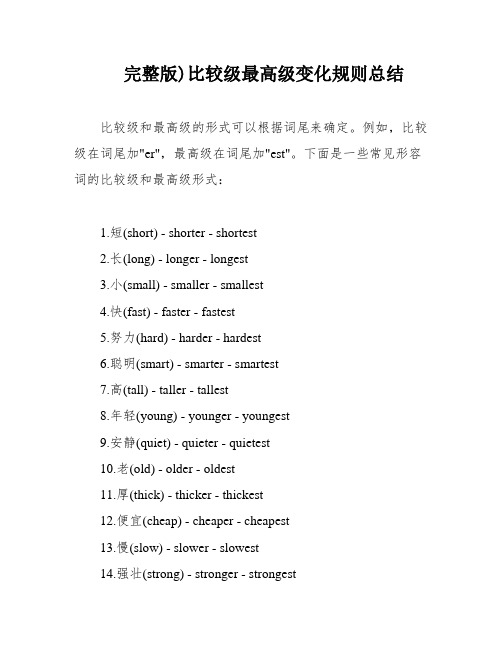
完整版)比较级最高级变化规则总结比较级和最高级的形式可以根据词尾来确定。
例如,比较级在词尾加"er",最高级在词尾加"est"。
下面是一些常见形容词的比较级和最高级形式:1.短(short) - shorter - shortest2.长(long) - longer - longest3.小(small) - smaller - smallest4.快(fast) - faster - fastest5.努力(hard) - harder - hardest6.聪明(smart) - smarter - smartest7.高(tall) - taller - tallest8.年轻(young) - younger - youngest9.安静(quiet) - quieter - quietest10.老(old) - older - oldest11.厚(thick) - thicker - thickest12.便宜(cheap) - cheaper - cheapest13.慢(slow) - slower - slowest14.强壮(strong) - stronger - strongest15.弱(weak) - weaker - weakest16.新(new) - newer - newest17.温暖(warm) - warmer - warmest18.冷(cold) - colder - coldest19.凉爽(cool) - cooler - coolest20.害羞(shy) - shyer - XXX21.紧(tight) - tighter - tightest22.干净(clean) - cleaner - cleanest23.聪明(clever) - cleverer - cleverest对于以不发音"e"结尾的单音节词,比较级直接加"r",最高级直接加"st"。
比较级和最高级(可编辑修改word版)

一、形容词的比较级和最高级变化规则;1、规则变化:(1)单音节词和少数双音节词一般在词尾加 er 或 est:如: small ---smaller --- the smallest(2)以不发音的 e 字母结尾的加 r,或 st:如: late --- later --- the latest(3)以辅音字母加 y 结尾的变 y 为 I 加 er 或 est:如: easy --- easier --- the easiest(4)以一个辅音字母结尾的重读闭音节词双写最后一个辅音字母再加 er 或 est:如 : big --- bigger --- the biggest以 er,ow 结尾的双音节词加 er 或 est如: slow --- slower --- the slowest(5)多音节词前加 more 或 most, 副词最高级前省略 the.如: important --- more important --- the most important2.不规则变化good / well --- better --- the best 好bad / badly / ill --- worse --- the worst 坏many / much --- more --- the most 多little --- less --- the least 少old --- older / elder --- the oldest / the oldest 老 , 旧far --- farther / further --- the farthest / the furthest 远常见形容词比较级、最高级变化一览表1.在形容词词尾加上“er”“est”构成比较级、最高级:bright (明亮的)—brighter—brightest broad(广阔的)—broader—broadest cheap(便宜的)—cheaper—cheapest clean(干净的)—cleaner—cleanestclever(聪明的)—cleverer—cleverest cold(寒冷的)—colder—coldestcool(凉的)—cooler—coolest dark(黑暗的)—darker—darkestdeep(深的)—deeper—deepest fast(迅速的)—faster—fastestfew(少的)—fewer—fewest great(伟大的)—greater—greatesthard(困难的,硬的)—harder—hardest high(高的)—higher—highestkind(善良的)—kinder—kindest light(轻的)—lighter—lightestlong(长的)—longer—longest loud(响亮的)—louder—loudest low(低的)—lower—lowest near(近的)—nearer—nearest new(新的)—newer—newest poor(穷的)—poorer—poorest quick(快的)—quicker—quickest quiet(安静的)—quieter—quietest rich(富裕的)—richer—richest short(短的)—shorter—shortest slow(慢的)—slower —slowest small(小的)—smaller—smallestsmart(聪明的)—smarter—smartest soft(柔软的)—softer—softeststrong(强壮的)—stronger—strongest sweet(甜的)—sweeter—sweetesttall(高的)-taller-tallest thick(厚的)—thicker—thickest warm(温暖的)—warmer—warmest weak(弱的)—weaker—weakest young(年轻的)—younger—youngest2.双写最后一个字母,再加上“er”“est”构成比较级、最高级:big(大的)—bigger—biggest fat(胖的)—fatter—fattest hot(热的)—hotter—hottest red(红的)—redder—reddestsad(伤心的)—sadder—saddest thin(瘦的)—thinner—thinnestwet(湿的)—wetter—wettest mad(疯的)—madder—maddest3.以不发音的字母e 结尾的形容词,加上“r”“st”构成比较级、最高级:able(能干的)—abler—ablest brave(勇敢的)—braver—bravest close(接近的)—closer—closest fine(好的,完美的)—finer—finest large(巨大的)—larger—largest late(迟的)—later—latest nice(好的)—nicer—nicest ripe(成熟的)—riper—ripest rude (粗鲁的)—ruder—rudest safe(安全的)—safer—safest strange(奇怪的)—stranger—strangest wide(宽广的)—wider—widest wise(睿智的,聪明的)—wiser—wisest white(白的)—whiter—whitest4.以字母y 结尾的形容词,把y 改为i,再加上“er”“est”构成比较级、最高级:busy(忙碌的)—busier—busiest dirty(脏的)—dirtier—dirtiest dry (干燥的)—drier—driest early(早的)—earlier—earliest easy(容易的)—easier—easiest friendly(友好的)—friendlier—friendliest funny(好玩的)—funnier—funniest happy(开心的)—happier—happiest healthy(健康的)—healthier—healthiest heavy(重的)—heavier—heaviesthungry(饿的)—hungrier—hungriest lazy(懒惰的)—lazier—laziest lucky(幸运的)—luckier—luckiest naughty(调皮的)—naughtier—naughtiest noisy(嘈杂的)—noisier—noisiest pretty(美丽的)—prettier—prettiest silly(傻的)—sillier—silliest spicy(辣的)—spicier—spiciest thirsty (渴的)—thirstier—thirstiest ugly(丑的)—uglier—ugliest4.双音节、多音节形容词,在单词前面加上“more”“most”构成比较级、最高级:afraid(害怕的)—more afraid—most afraid beautiful(美丽的)—more beautiful—most beautiful careful(仔细的)—more careful—most careful cheerful(开心的)—more cheerful—most cheerful crowded(拥挤的)—morecrowded—most crowded dangerous(危险的)—moredangerous—most dangerous delicious(美味的)—moredelicious—most delicious difficult(困难的)—more difficult—most difficult exciting(令人兴奋的)—more exciting—most exciting expensive(昂贵的)—more expensive—mostexpensive famous(著名的)—more famous—most famousfrightened(受惊的)—more frightened—most frightenedfrightening(令人害怕的)—more frightening—most frighteninghard-working(勤奋的)—more hard-working—most hard-workinghelpful(有帮助的)—more helpful—most helpful honest(诚实的)—more honest—most honest important(重要的)—more important—most important interesting(有趣的)—more interesting—most interesting polite(有礼貌的)—more polite—most polite terrible(可怕的)—moreterrible—most terrible tired(累的)—more tired—most tired5.不规则变化的形容词:bad(坏的)—worse—worst good(好的)—better—bestfar(远的)—farther—farthest (far—further—furthest) ill(病的)—worse—worst little(少的)—less—leastmany(多的)—more—most much(多的)—more—mostold(年老的)—older—oldest ( old—elder—eldest) well(好的,身体好的)—better—best一. 写出下列形容词或副词的比较级和最高级.badcleanfamousdirtybigsmallheavylittlehardhappyfarexpensivewelleasywideyoungrudecheapuglybusyoldnoisyinterestinghotcold many brightboring difficultbeautifulthingoodstronghighwarmlateweaktallshortloudlazyquickangrycleversmartlow二、选择填空1.Which does Jimmy like , Chinese or Art?A.wellB. bestC. betterD. much2.The Changjiang River is one of in the world.A. the longest riverB. longest riversC. the longest riversD. longer rivers3.of the two women is Mrs Brown.A.The beautifulB. The more beautifulC. More beautifulD. The most beautiful4.My mooncake is nicer his.A.likeB. withC. forD. than5.You are fatter than .A.heB. hisC. himD. he is tall6.He jumps of the three.A.farB. furtherC. farthestD. furthest7.My hair is longer than .A.my sisterB. KateC. my brother’sD. Lucys’8.There are paper here .Please bring some.A.littleB. lessC. fewerD. a little9.The pen is than that one.A.more cheapB. cheapC. much cheaperD. quite cheaper10.Tom speaks Chinese better than Jimmy.A. moreB. veryC. a lot ofD. much11.There are girls in Class Two than in Class Four.A. moreB. nicestC. mostD. best12.It’s too for you to do that.A. easyB. more dangerousC. harderD. the easiest13.Who has apples now, Jim, Lily or Lucy?A. muchB. biggestC. betterD. the most14.You have more rulers than me. But are nicer than .A.mine, yoursB. mine, yourC. my, yoursD. my, your15.Tingting is than Meimei, but Meimei is than Tingting.A.all, strongerB. taller, strongestC. tallest, strongD. taller, stronger16.Mother is in my family.A. busyB. busierC. the busiestD. more busy17.There are in the park on Sunday.A. more childrenB. a lot of peopleC. much men and womenD. many peoples18.-This blue sweater is too big for me .-Will you please show me a one?A. smallB. smallerC. the smallestD. smallest19.No one is Mary in the class.A. so tallest asB. as taller asC. so high asD. so tall as20. This bike is than that one.A. twenty yuan dearB. twenty yuan dearerC. dear twenty yuanD. dearer twenty yuan[参考答案]CCDDA CDBCD AADAD CBBDB三、用所给词的适当形式填空1.Y our classroom is (wide) and (bright) than ours.2.T here are (few) hours of sunlight a day in winter than in summer.3.Which do you like (well) , maths or chemistry?4.This is the (good) film I have ever seen.5.Africa is the second (large) continent.6.What he said made his mother much (angry) .7.I’m not as (careful) as he.8.We’ve got as (many) books as we need.9.Pratice as (much) as you can.10.They have done (much) work with (little) money.11.You’re the (kind) person I’ve ever met.12.He is (young) than his two sisters.13.The (old) I get, the (strong) I seem to feel.14.The weather is getting (warm) and (warm) .15.Summer is (hot) season of the year.[参考答案] 1. wider, brighter 2. fewer 3. better 4. best 5. largest 6. angry 7. careful 8. many 9. much 10. more, less 11. kindest 12. younger 13. older, stronger, 14. warmer, warmer 15. the hottest。
(word完整版)德语形容词比较级和最高级

形容词比较级和最高级1. 形容词比较级和最高级的构成1.1 形容词和副词的比较级由原级加-er,最高级则加-st,做状语或表语时前面加am,后面加-sten.schön schöner am schönstenfleißig fleißiger am fleißigstenbekannt bekannter am bekanntestengenau genauer am genau(e)sten1.2 大多数词干元音为a,o,u的单音节形容词升级时需要变音,如:alt älter am ältestenlang länger am längstenrot röter am rötesten另有:arm, dumm, jung, kalt, klug, kurz, scharf, stark,warm, 但也有gesund例外:schmal – schmaler , schlank – schlanker1.3 以el,er或en结尾的形容词构成比较级时,可省去-e,然后加-er,如:dunkel dunkler am dunkelstenteuer teurer am teuerstentrocken trockner am trockensten1.4 当它们以-d,-t,-z, -ß,-ss 和-sch结尾的形容词构成最高级时加-e st,如:wild wilder am wild e sten breit breiter am breit e sten stolz stolzer am stolz e sten heißheißer am heiße sten krass krasser am krass e sten hübsch hübscher am hübsch e sten 但是groß, größer, am größten1.5 其他少数形容词和副词的特殊升级形式gut besser am bestengroßgrößer am größtengern lieber am liebstenhoch höher am höchstenoft öfter am häufigstenhäufig häufiger am häufigstenviel mehr am meistenwenig weniger(minder) am wenigsten (am mindesten)bald eher am ehesten2. 形容词比较级的用法2.1 形容词各级的用法A)对两件性质、特征相同的事物进行同级比较,可用“so(ebenso,genauso)+形容词/副词原级+wie”,如:1. 这幅画和那幅画一样美。
形容词的比较级和最高级
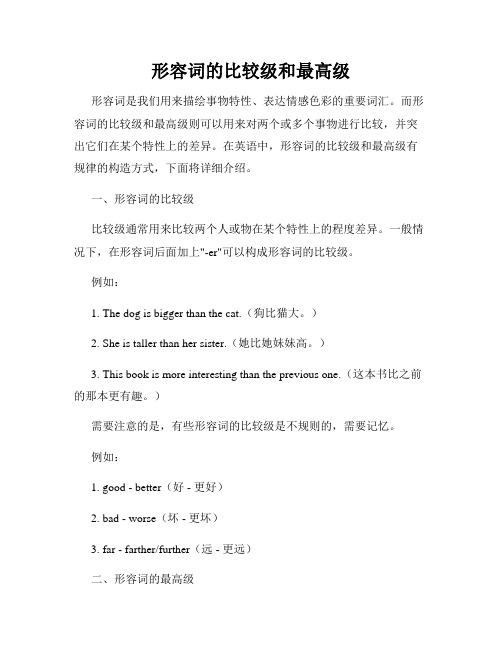
形容词的比较级和最高级形容词是我们用来描绘事物特性、表达情感色彩的重要词汇。
而形容词的比较级和最高级则可以用来对两个或多个事物进行比较,并突出它们在某个特性上的差异。
在英语中,形容词的比较级和最高级有规律的构造方式,下面将详细介绍。
一、形容词的比较级比较级通常用来比较两个人或物在某个特性上的程度差异。
一般情况下,在形容词后面加上"-er"可以构成形容词的比较级。
例如:1. The dog is bigger than the cat.(狗比猫大。
)2. She is taller than her sister.(她比她妹妹高。
)3. This book is more interesting than the previous one.(这本书比之前的那本更有趣。
)需要注意的是,有些形容词的比较级是不规则的,需要记忆。
例如:1. good - better(好 - 更好)2. bad - worse(坏 - 更坏)3. far - farther/further(远 - 更远)二、形容词的最高级最高级用来描述一个人或物在某个特性上超过其他所有人或物的程度。
一般情况下,在形容词前面加上"the",再加上"-est"可以构成形容词的最高级。
例如:1. He is the tallest student in the class.(他是班里最高的学生。
)2. This is the most interesting movie I have ever watched.(这是我看过的最有趣的电影。
)3. It is the best book I have read.(这是我读过的最好的书。
)同样需要记忆的是,有些形容词的最高级也是不规则的。
例如:1. good - best(好 - 最好)2. bad - worst(坏 - 最坏)3. far - farthest/furthest(远 - 最远)三、比较级和最高级的使用方式除了直接用于比较两个人或物的特性差异外,比较级和最高级也可以与"than"、"of"等词搭配使用。
2023年小升初比较级最高级
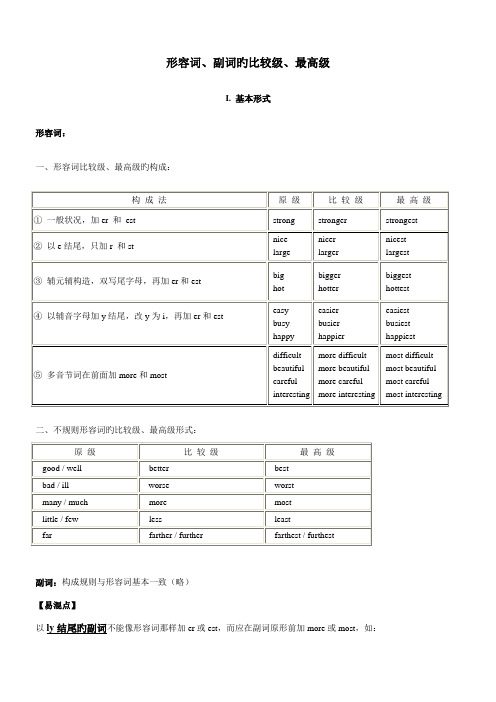
形容词、副词旳比较级、最高级I. 基本形式形容词:一、形容词比较级、最高级旳构成:二、不规则形容词旳比较级、最高级形式:副词:构成规则与形容词基本一致(略)【易混点】以ly结尾旳副词不能像形容词那样加er或est,而应在副词原形前加more或most,如:quickly→more quickly→most quickly slow ly→more slow ly→most slowlyII. 基本使用方法一、比较级1.比较级一般由“形容词/副词比较级+ than + …”构成,表达一方比另一方“愈加……”。
如:Mary is happier than Jane. 玛丽比珍妮幸福。
(形容词和系词连用)He lives more happily than I. 他过得比我幸福。
(副词修饰行为动词)【拓展】强调两者之间旳比较,比较级前加the, 如:He is the stronger of the two. 他是两个人中比较高旳那个。
2.注意than前后两项相比较旳人或事物要一致。
如:She does better in English than Maths. 相比于数学,她更擅长英语。
I’m better at English than her. 我比她更擅长英语。
3.比较级前可用much, a little等词语来修饰,表达“……得多”,“……一点”等意思。
如:Japan is a little larger than Germany. 日本比德国大一点儿。
His house is much bigger than mine. 他家比我家大诸多。
【注意】very, too, so, as......as等只能修饰原级,如:English is so difficult. 英语是如此旳难。
My brother is very strong. 我哥哥很强健。
My sister is as old as her. 我妹妹和她同样大。
完整word版形容词和副词的比较级和最高级

一、形容词和副词的概念形容词:是修饰名词(人或事物),表示名词的性质,特征或属性一种词类。
它在句中作定语、表语和宾语补足语。
词叫副词。
副词在句中多作副词:用来修饰动词.形容词及其他副词的状语.二、形容词和副词的用法的名词之前。
①形容词作定语一般放在被修饰big treesa new book, two。
如:等②形容词放在系动词be , get, turn, become, keep, stay, look, smell, feel, taste, sound, 等之后。
如:1. I am short・2・She looks fine・3・ They turn green.③如果形容词修饰不定代词something,anything, everything, nothing等时,要放在不定代词后面。
如:something interesting nothing new④副词放在所修饰的动词之后、形容词和副词之前。
如果前面是行为动词,则后面用副词。
如:1. She works hard・(修饰动词)2.I am very busy.(修饰形容词)3.He runs too quickly ・(修饰副词)4.We play happily.(修饰动词)⑤通常在形容词后加-ly变成副词。
slow —►____ real t ___________usual —> _____ careful—> _______easy —______ happy—> ________heavy —> ____ angi^y—* _______形容词副词比较级最高级变化形式归纳大多数形容词和副词有比较级和最高级的变化,即原级、比较级和最高级,用来表示事物的等级差别。
原级即形容词的原形,比较级和最高级有规则变化和不规则变化两种。
规则变化1 •单音节以及少数双音节的词后面直接加-er或-est最高级比较级原级tallest taller tallsmartest smarter smartshortestshorter shortesto结尾的双音节形容词末尾加特别提醒:以-y, -er, -ow, leer和healthy, funny, busy, hungry, easy, happy, early, pretty, lazy,如:heavy, dirty, clever, narrow o -stp或2.以不发音的e结尾只加最高级原级比较级nicest nice nicerfinest fine finerlargestlarge larger-est或i,再加-er3•“以辅音字母+y”结尾的词改y为最高比较原easiesteasiereasyprettiestprettierprettyhappiesthappierhappyfunniestfunnierfunnybusiestbusierbusy再加以一个元音加一个辅音字母结尾的重读闭音节词,双写后面的辅音字母,4 •一est最高级原级比较级thinnest thin thinner hottest hotter hotbiggestbigger big等词含有字母组合,且发的是长元音,不用new, few, slow, clean特别提醒: 双un构成的三音节形容词不适合上述情况,特别提醒:以形容前缀unhappy-一unhappier一一unhappiest, untidy一一untidier一一untidiest 如26.以形容词+ly构成的副词要在前面加more, most原级比较级最高级most slowly more slowly slowlymost quickly more quickly quicklymost angrily more angrily angrilymost softly more softly softlymost noisilymore noisilynoisily特另II提醒:early -- e arlier --- earliest7. ill ING分词和ED分词演变过来的形容词(包括不规则动词如know—known)只能加more或most来表示它们的比较级和最高级。
形容词和副词的比较级和最高级(完美版)
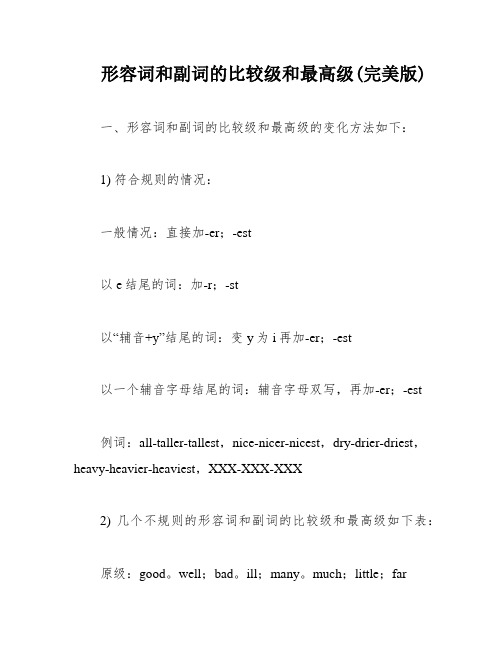
形容词和副词的比较级和最高级(完美版)一、形容词和副词的比较级和最高级的变化方法如下:1) 符合规则的情况:一般情况:直接加-er;-est以e结尾的词:加-r;-st以“辅音+y”结尾的词:变y为i再加-er;-est以一个辅音字母结尾的词:辅音字母双写,再加-er;-est例词:all-taller-tallest,nice-nicer-nicest,dry-drier-driest,heavy-heavier-heaviest,XXX-XXX-XXX2) 几个不规则的形容词和副词的比较级和最高级如下表:原级:good。
well;bad。
ill;many。
much;little;far二、形容词和副词比较级的用法:级别比较程度肯定表达方式和意义例句(备注)原级同等程度 As+原级+as (像……一样) XXX。
not + so (as) +原级+as (不如……那样) English is not so difficult as science。
比较级不同程度 (用于两者比较) 比较级+than (比……) XXX XXX。
比较级前面可以加much。
far。
even。
still。
a lot。
a little。
a bit等程度加深 I like pork better than beef。
最高级同一范围内的最高程度 The +比较级,the +比较级(越……,越……) XXX gets。
the XXX.The XXX reads。
the better their XXX。
This is because reading can XXX.The highest degree of something is expressed using the superlative form。
which is used for three or more things。
Forexample。
"Spring is the best season of the year." Another example is "Lin Tao jumped the farthest of all."When using the superlative form with an adverb。
小升初英语语法专题精讲学案 形容词的比较级和最高级(含答案)

形容词的比拟级和最高级Start up1. Which house is bigger, your house or his house? 哪一个房子更大,你的房子还是他的房子?2. Summer is the hottest season in a year. 夏天是一年中最热的季节。
一、形容词的比拟等级大多数的形容词有三个等级:原级,比拟级,最高级。
原级就是形容词的原形,比拟级和最高级的词性有规那么与不规那么之分。
二、形容词的比拟级和最高级规那么变化构成法原级比拟级最高级1. 一般在词尾加-er或-est greatgreater the greatest2.以不发音的e结尾加-r或-st brave braver the bravest3. 以辅音字母结尾的重读闭音节,双写尾字母加-er或-est big bigger the biggest4. 辅音字母加y结尾,那么变y为i,再加-er或-est happy happier the happiest5. 双音节和多音节单词在前加more或the most difficult more difficult the most difficult不规那么变化原级比拟级最高级bad worse the worstgood/wellbetter the bestmany/much more the mostlittle/few less the farthest/ the furthestold older/elder the oldest/eldest用法总结〔1〕比拟级用于两者间的比拟,表示在两者中间一方比另一方“更加…〞;句子结构:A+be动词+形容词比拟级+than+B…eg: China is bigger than US.〔2〕最高级用于三者或三者以上的比拟;句子结构:A+be动词+the+形容词最高级+名词+表示范围的短语或从句(如all, of all, of the tree, in the world, that has ever taken place等)。
比较级最高级语法

除此之外,还有几个特殊的单词,它的比较级和最高级都是不规则的,如:many/much(原形)–more(比较级)–most(最高级)little/few(原形)–less(比较级)–least(最高级)good(原形)–better(比较级)–best(最高级)bad(原形)–worse(比较级)–worst(最高级)far(原形)–farther/further(比较级)–farthest/furthest(最高级)old(原形)-older/elder(比较级-oldest/eldest(最高级)【习题检测】I.Write the answers.(根据题意,写出答案。
)1.The black dog is__________(thin)than the white dog.2.This balloon is__________(big)than yours.3.My bag is__________(heavy)than yours.4.John is__________(strong)than Mike.5.I am__________(short)than Lucy.II.用所给词的正确形式填空,每词用一次。
Young long tall heavy old thin1.Monkey’s tail is________than the rabbit’s tail.2.Dick is11years old.Nina is12years old.Dick is_______than Nina.3.I’m140cm______.4.I’m40kg.You’re42kg.I’m_______than you.5.How______are you?I’m45kg.III.选择填空。
1.How heavy are you?__________.A.I’m48years old.B.I’m48kg.C.I’m48cm.2.Tom is120cm.Jack is__________than him.A.tallB.tallerC.heavier3.How heavy is the whale?__________.A.It’s strong.B.It’s heavier.C.It’s3600kg.4.How__________are you?A.oldB.olderC.taller5.The monkey has a__________tail.A.tallB.longC.longer6.How big are your feet?_________.A.I wear Size17.B.I’m bigger than you.C.I’m17bigger.7.Jim is40kg.Tom is38kg.Tom is________than Jim.A.tallerB.thinnerC.heavier8.I’m11years old.My sister is2years older than me.She is__________years old.9.I am________than my aunt.A.strongB.bigC.shorter10.My father is________than my grandpa.A.olderB.youngerC.smallerIV.连词成句。
小升初英语总复习四:形容词副词比较级最高级-2
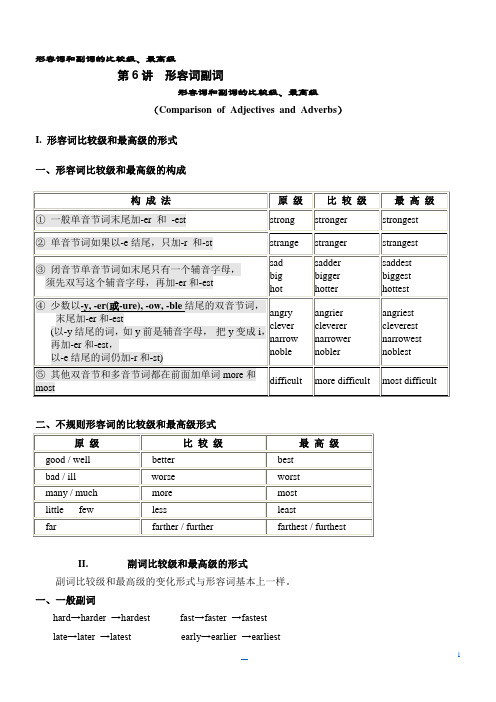
形容词和副词的比较级、最高级第6讲形容词副词形容词和副词的比较级、最高级(Comparison of Adjectives and Adverbs)I. 形容词比较级和最高级的形式一、形容词比较级和最高级的构成二、不规则形容词的比较级和最高级形式II.副词比较级和最高级的形式副词比较级和最高级的变化形式与形容词基本上一样。
一、一般副词hard→harder →hardest fast→faster →fastestlate→later →latest early→earlier →earliest二、特殊副词well →better →best much →more →mo stbadly →worse →worst little →less →least三、开放类副词开放类副词即以后缀-ly结尾的副词不能像形容词那样加-er或-est,而应在副词原形前加more或m ost。
如:quickly →more quickly →most quickly quietly →more quietly →most quietlyIII.形容词与副词比较级和最高级的基本用法一、比较级1.比较级通常由“形容词(副词)比较级+th an+…” 构成,表示在两者中间一方比另一方“更加……”。
连词than后可接句子,也可接名词、代词、名词短语、介词短语、动词、动词不定式、-ing结构和-ed结构,有时也可省去than。
如:Mary is happier than Jane. 玛丽比珍妮幸福。
(形容词和系词连用)He lives more happily than I.他过得比我幸福。
(副词修饰行为动词)2.注意than前后两项相比较的人或事物要一致。
如:The purpose of the research had a more important meaning for them than it did for us.Sound travels faster through water than through air.3.比较级前还可用much, even, still, a little等词语来修饰,表示“……得多”,“甚至……”,“更……”,“……一些”等意思。
小学形容词比较级和最高级(共5篇)
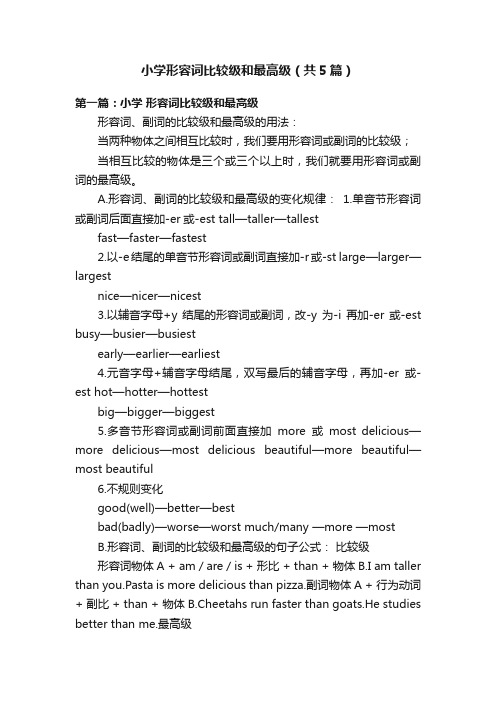
小学形容词比较级和最高级(共5篇)第一篇:小学形容词比较级和最高级形容词、副词的比较级和最高级的用法:当两种物体之间相互比较时,我们要用形容词或副词的比较级;当相互比较的物体是三个或三个以上时,我们就要用形容词或副词的最高级。
A.形容词、副词的比较级和最高级的变化规律:1.单音节形容词或副词后面直接加-er或-est tall—taller—tallestfast—faster—fastest2.以-e结尾的单音节形容词或副词直接加-r或-st large—larger—largestnice—nicer—nicest3.以辅音字母+y结尾的形容词或副词,改-y为-i再加-er或-est busy—busier—busiestearly—earlier—earliest4.元音字母+辅音字母结尾,双写最后的辅音字母,再加-er或-est hot—hotter—hottestbig—bigger—biggest5.多音节形容词或副词前面直接加more或most delicious—more delicious—most delicious beautiful—more beautiful—most beautiful6.不规则变化good(well)—better—bestbad(badly)—worse—worst much/many —more —mostB.形容词、副词的比较级和最高级的句子公式:比较级形容词物体A + am / are / is + 形比 + than + 物体B.I am taller than you.Pasta is more delicious than pizza.副词物体A + 行为动词+ 副比 + than + 物体B.Cheetahs run faster than goats.He studies better than me.最高级1)物体A + am / are / is + the + 形最高级 + 比较范围(of + 人/物,in +地方).I am the tallest in the class.Pasta is the most delicious food of the three.2)物体A + 行为动词 + 副词最高级 + 比较范围(of + 人/物,in + 地方).Cheetahs run fastest in the world.He studies best of us.一.词形变换。
(完整)比较级最高级

(一 )比较级和最高级的构成:1 加-er,-est 构成比较级和最高级。
【1】单音节形容词和副词high-higher-highest hard-harder-hardest 【2】以不发音的 -e 结尾的safe-safer-safest late-later-latest【3】辅音字母要双写的情况:【4】以辅音加 -y 结尾的情况dry-drier-driest merry-merrier-merrist 2 加 more,most 构成比较级和最高级。
【1】多音节的形容词和副词expensive-more expensive-most expensivecarefully-more carefully-most carefully【2】由形容词加 -ly 构成的副词slowly-more slowly-most slowlyhighly-more highly-most highly【3】以-ful,-less,-able,-ous,-ive,-ing 等结尾的双音节形容词useless-more useless-most uselessserious-more serious-most seriuos【4】分词形容词 tired,pleased 及 glad,often,real,right,wrong 等单音节形容词tired-more tired-most tiredglad-more glad-most glad( 3 )形容词、副词的比较级和最高级的不规则构成法。
bad/ill/badly-worse-worstmany/much-more-mostlittle-less-leastfar-farther/further-farthest/furthestold-older/elder-oldest/eldest(二) 比较级和最高级的用法1 比较级的表示法:主语 +be +比较级+than …;主语+谓语+比较级+than …( 1 )不同主语的比较:He is two years younger than I.This machine works better than that one.Li Ming studies harder than Wang Ling.( 2 )同一主语不同方面的比较:She is now happier than she has ever been.The exam was easier than we expected.We have had much more rain this year than last year.( 3 )用于修饰比较级的词: even,(very) much,far,a lot,stillThis book is much thicker than that one.He works even harder than before.( 1 ) 形容词和副词最高级的用法三者或三者以上的比较用最高级。
形容词比较级和最高级(初中阶段)
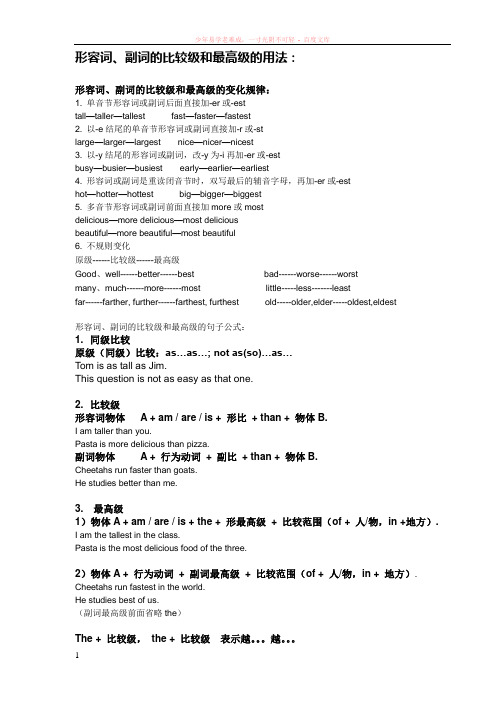
形容词、副词的比较级和最高级的用法:形容词、副词的比较级和最高级的变化规律:1. 单音节形容词或副词后面直接加-er或-esttall—taller—tallest fast—faster—fastest2. 以-e结尾的单音节形容词或副词直接加-r或-stlarge—larger—largest nice—nicer—nicest3. 以-y结尾的形容词或副词,改-y为-i再加-er或-estbusy—busier—busiest early—earlier—earliest4. 形容词或副词是重读闭音节时,双写最后的辅音字母,再加-er或-est hot—hotter—hottest big—bigger—biggest3. 最高级1)物体A + am / are / is + the + 形最高级+ 比较范围(of + 人/物,in +地方).I am the tallest in the class.Pasta is the most delicious food of the three.2)物体A + 行为动词+ 副词最高级+ 比较范围(of + 人/物,in + 地方). Cheetahs run fastest in the world.He studies best of us.(副词最高级前面省略the)The + 比较级,the + 比较级表示越。
越。
The more you eat, the fatter you will get.More and more 表示越来越多Today,more and more people like online shopping.比较级+比较级表示越来越。
The road is getting wider and wider.一. 词形变换。
比较级最高级large _________________ ___________________fast _________________ ___________________easy _________________ ___________________wet _________________ ___________________good _________________ ___________________5. The boy is not so _________ (interesting) as his brother.6. This dress is _____________________ that.( as…as…, expensive)7. I am _____________ than my brother, but my little sister is the ______________ of us. (fat, fatter, fattest )8. Which can swim ______________, fish or sharks? ( well,better, best )9. The green book is a _______________ book, but the red one is much _____________ than the green one. It’s the ______________ book in the bookshop. (nice, nicer, nicest )10. Look, Janet is jumping ______________ (high, higher) than Mike.11.Mr Hare runs much ______________ (fast, faster) than Mr Turtle. Mr Hare needn’t run______________ (fast, faster) now.12. In the gym, Tommy is playing table tennis ______________ (well, better) than Jimmy.13. This book is very ______________ (interesting, more interesting) , but that one is ______________ (interesting, more interesting) than it.14. The film is the ______________ (horrible, more horrible, most horrible) film of all.15. It’s summer now. The weather is getting _______________. (hot and hot, hotter and hotter, hottest and hottest)16. The U.S.A. is one of _________________ (richer, most rich, the richest) countries in the world.(三)选择填空:1.He feels _____ today than yesterday.A. tiredB. more tiredC. more tirederD. much tired(四)翻译句子:1.本书跟那本书一样有趣。
(完整word版)英语比较级和最高级

形容词比较级和最高级的形式一、形容词比较级和最高级的构成形容词的比较级和最高级变化形式规则如下构成法原级比较级最高级①一般单音节词末尾加和②单音节词如果以结尾,只加和③闭音节单音节词如末尾只有一个辅音字母,须先双写这个辅音字母,再加和bighot sadderbiggerhotter saddestbiggesthottest④少数以或结尾的双音节词,末尾加和以结尾的词,如前是辅音字母,把y变成i,再加和,以结尾的词仍只加和CleverNarrowNoble angrierCleverernarrowernobler angriestcleverestnarrowestnoblest⑤其他双音节和多音节词都在前面加单词more和most different moredifferent mostdifferent1) The most high 〔A〕mountain in 〔B〕the world is Mount Everest,which is situated 〔C〕in Nepal and is〔D〕 .2) This house is spaciouser 〔A〕than that 〔B〕white 〔C〕one I bought in Rapid City,South Dakota 〔D〕last year.3) Research in the social 〔A〕sciences often proves difficulter 〔B〕than similar 〔C〕work in the physical 〔D〕sciences.二、形容词比较级或最高级的特殊形式:1. 三个或三个以上音节的形容词只能加more和most只能说more beautiful而不能说beautifuller; 只能说the most beautiful而不能说beautifullest。
但是,以形容前缀结尾的三音节形容词不适合上述情况,如unhappy,untidy,我们可以说:unhappier→unhappiest, untidier→untidiest2. 由分词和分词演变过来的形容词(包括不规则动词如know→known)只能加more或most来表示它们的比较级和最高级more(most) striking, more(most) interesting, more(most) wounded, more(most)worn等。
(完整版)形容词比较级最高级变化规则(完美打印版)(可编辑修改word版)
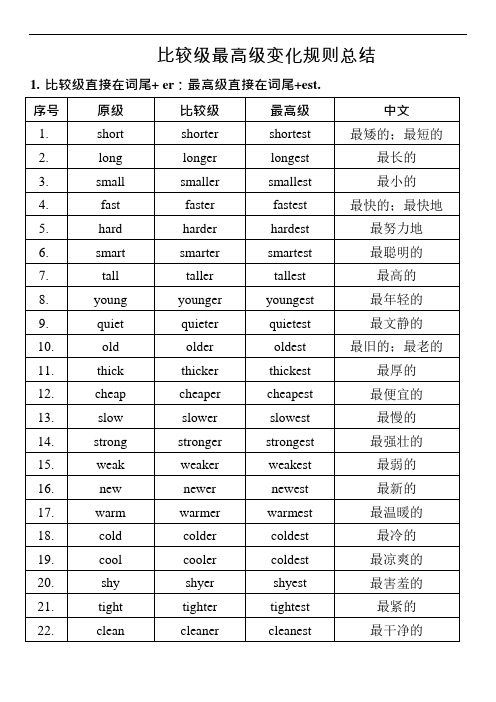
最聪明的
2.以不发音e结尾的单音节词,比较级直接加---r;最高级直接加---st.
序号
原级
比较级
最高级
中文
1.
nice
nicer
nicest
最友好的
2.
large
larger
largest
最大的
3.
fine
finer
finest
最好的
4.
wide
wider
widest
最宽的
5.
safe
hot
hotter
hottest
最热的
5.
slim
slimmer
slimmest
最苗条的
6.
wet
wetter
wettest
最湿的
warmer
warmest
最温暖的
18.
cold
colder
coldest
最冷的
19.
cool
cooler
coldest
最凉爽的
20.
shy
shyer
shyest
最害羞的
21.
tight
tighter
tightest
最紧的
22.
clean
cleaner
cleanest
最干净的
23.
clever
cleverer
safer
safest
最安全的
3.在重读闭音节(即:辅音+元音+辅音)中,要双写结尾的辅音字母,然后比较级加---er;最高级加---est。
序号
原级
比较级
最高级
(word完整版)英语比较级和最高级的用法.docx
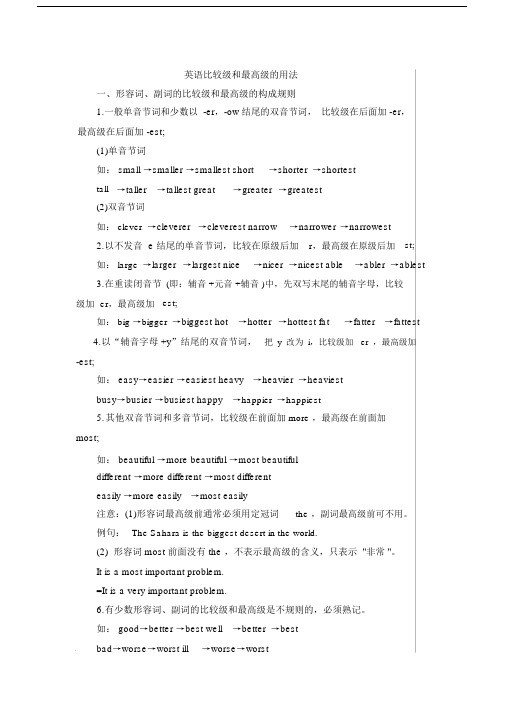
英语比较级和最高级的用法一、形容词、副词的比较级和最高级的构成规则1.一般单音节词和少数以 -er,-ow 结尾的双音节词,比较级在后面加 -er,最高级在后面加 -est;(1)单音节词如: small →smaller →smallest short→shorter→shortesttall→taller→tallest great→greater→greatest(2)双音节词如: clever→cleverer→cleverest narrow→narrower→narrowest2.以不发音 e 结尾的单音节词,比较在原级后加-r,最高级在原级后加-st;如: large→larger→largest nice→nicer→nicest able→abler→ablest3.在重读闭音节(即:辅音 +元音 +辅音 )中,先双写末尾的辅音字母,比较级加 -er,最高级加-est;如: big →bigger→biggest hot→hotter→hottest fat→fatter→fattest4.以“辅音字母 +y”结尾的双音节词,把y改为i,比较级加-er,最高级加-est;如: easy→easier →easiest heavy→heavier→heaviestbusy→busier →busiest happy→happier→happiest5.其他双音节词和多音节词,比较级在前面加more ,最高级在前面加most;如: beautiful →more beautiful →most beautifuldifferent →more different →most differenteasily →more easily→most easily注意:(1)形容词最高级前通常必须用定冠词the ,副词最高级前可不用。
例句:The Sahara is the biggest desert in the world.(2)形容词 most 前面没有 the ,不表示最高级的含义,只表示 "非常 "。
(完整word版)形容词比较级最高级变化规则(完美打印版)
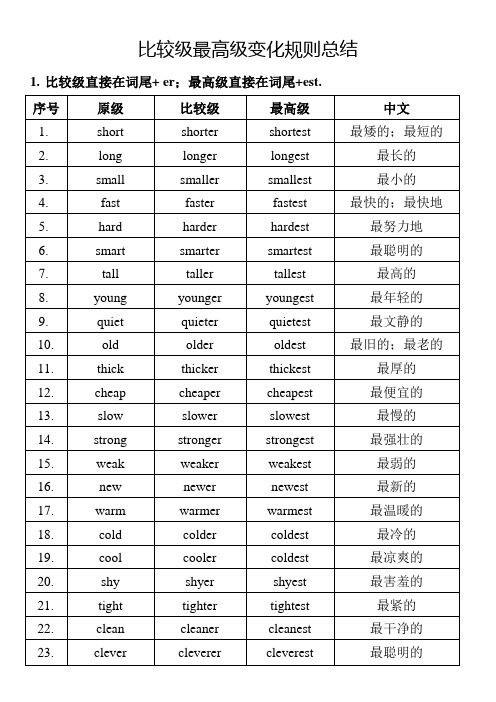
thicker
thickest
最厚的
12.
cheap
cheaper
cheapest
最便宜的
13.
slow
slower
slowest
最慢的
14.
strong
stronger
strongest
最强壮的
15.
weak
weaker
weakest
最弱的
16.
new
newer
newest
最新的
17.
warm
healthiest
最健康的
14.
salty
saltier
saltiest
最咸的
15.
angry
angrier
angriest
最生气的
5.其他双音节词和多音节词变比较级在原级前加more;变最高级在原级前加most。
序号
原级
比较级
最高级
中文
1.
friendly
more friendly
most friendly
最高兴的
8.
heavy
heavier
heaviest
最重的
9.
friendly
friendlier
friendliest
最友好的
10.
shy
shier
shiest
最害羞的
11.
lucky
luckier
luckiest
最幸运的
12.
dry
drier
driest
最干的
13.
healthy
healthier
- 1、下载文档前请自行甄别文档内容的完整性,平台不提供额外的编辑、内容补充、找答案等附加服务。
- 2、"仅部分预览"的文档,不可在线预览部分如存在完整性等问题,可反馈申请退款(可完整预览的文档不适用该条件!)。
- 3、如文档侵犯您的权益,请联系客服反馈,我们会尽快为您处理(人工客服工作时间:9:00-18:30)。
比较级& 最高级一、形容词的比较级1、形容词比较级在句子中的运用:两个事物或人的比较用比较级,比较级后面一般带有单词than。
比较级的句子结构通常是:什么 + 动词be (am , is , are ) + 形容词比较级 + than(比)+ 什么 ,如:I'm taller and heavier than you. (我比你更高和更重。
)An elephant is bigger than a tiger. (一只大象比一只老虎更大。
)比较级前面可以用more, a little 来修饰表示程度。
than后的人称代词用主格(口语中可用宾格)。
2.形容词加er的规则:① 一般的直接在词尾加er ,如 tall - taller , strong - stronger ,② 以e结尾的,直接加r ,如 fine - finer ,③ 以辅音字母加y结尾的,先改y为i再加er,如funny - funnier④以一个元音字母和一个辅音字母结尾,双写最后的字母再加er,如big--bigger, thin--thinner ,hot–-hotter, sad--sadder,fat—fatter3.不规则形容词比较级:good--better, many/ much ----morebeautiful--more beautiful, expensive--more expensive二、副词的比较级1.形容词与副词的区别 (有be用形,有形用be;有动用副,有副用动)⑴在句子中形容词一般处于名词之前或be动词之后。
⑵副词在句子中最常见的是处于实义动词之后。
2.副词比较级的变化规则基本与形容词比较级相同☆注意☆1、比较的两者应该是互相对应的可比较的东西。
典型错误:My hair is longer than you.(我的头发比你更长。
)比较的两者是我的头发、你(整个人),那么比较的对象就没有可比性。
应该改为:My hair is longer than yours. 或My hair is longer than your hair.2、如果比较的两者是一样的时候,我们会用as…as…这个词组。
它的用法是:什么+be+as+形容词原形+as+什么,意思是什么和什么一样……。
如:I'm as tall as you.(我和你一样高。
)My feet are as big as yours.(我的脚和你的一样大。
)一、形容词的最高级变化类似于比较级,只是把词尾的er改成est,如:tall (原形)- taller (比较级)- tallest (最高级)long(原形)- longer(比较级)- longest(最高级)big (原形)- bigger(比较级)- biggest(最高级)few (原形) –fewer(比较级)--fewest(最高级)二、除此之外,还有几个特殊的单词,它的比较级和最高级都是不规则。
如:many / much(原形)- more(比较级)- most(最高级)little (原形) - less (比较级)- least(最高级)good(原形)/well - better(比较级) - best(最高级)bad (原形)/badly - worse(比较级) - worst(最高级)far(原形)-- farther(比较级)—farthest(最高级)further(比较级)-- furthest(最高级)巩固练习old__________ young________ tall_______ long________short________ strong________ big________ small_______fat_________ thin__________ heavy______ light________ nice_________ good_________ beautiful__________________low__________ high_________ slow_______ fast________late__________ early_________ far_________ well_______练习一、请写出下列形容词的比较级和最高级。
big ______ ______ small ______ ________ new ______ ________tall ______ ______ short______ ________ old______ ________weak ______ ______ strong ______ ______ fat______ ________hot ______ ______ cold ______ ________ thin ______ ________nice ______ _____ good ______ ________ high______ ________bad ______ ______ much ______ ________ low______ ________well ______ ______ far ______ ________ little ______ ________cheap______ ______ easy ______ ________ ugly ______ ________heavy ______ ______ cute ______ ________ fine______ ________early ______ _____ tidy______ ________ bright______ ________large ______ ______ happy ______ _______ pretty______ ________young _______ _______wet _____ _______ long______ _______clean_______ _______ dirty_____ ______ lovely______ _________famous________ __________ boring __________ _____________interesting ________ __________ important ________ ____________delicious _________ __________二、根据句意填入单词的正确形式:1. My brother is two years __________(old)than me.2. Tom is as ________(fat) as Jim.3. Is your sister __________(young) than you? Yes,she is.4. Who is ___________(thin),you or Helen? Helen is.5. Whose pencil-box is __________(big),yours or hers? Hers is.6. Mary’s hair is as __________(long) as Lucy’s.7.Ben ______ (jump) ________ (high) than some of the boys in his class.8.________ Nancy sing __________ (well) than Helen? Yes, she _____.9.Fangfang is not as _________ (tall) as the other girls.10.My eyes are __________(big) than ________ (she)..11.Which is ___________(heavy),the elephant or the pig?12.Who gets up _________(early),Tim or Tom?13._____the girls get up_______(early) than the boys? No,they______.14. Jim runs _____(slow). But Ben runs _____(slow).15.The child doesn’t______(write) as ____(fast) as the students.三、用形容词的适当形式填空。
1. Fred is the __________(short ) in his class .2. My book is ________( new ) than my sister’s .3. That piece of chicken is the ___________( heavy )in the fridge .4. Her rule is ______(long), and it’s the _______(long)of ours all .5. Is a fish _________(thin) than a bird ?6. A rose tree isn’t _______( short ) than a pear tree .7. The leopard can run _______( fast), but the cheetah can run _____( fast) than it . It can run ________( fast ) in the world .8. Is she the ________(old ) woman in the world ?9. Which is _______( big ), a dinosaur or a blue whale ?The blue whale is _________( big ) than a dinosaur , it is the _______(big) animal in the world . And elephant is the ________(big) animal on land .10. My father leaves home _______(early ) than me .11. This zoo is much _______(good ) than the old one .12. My brother is much _______(tall ) than my cousin .13. The shoe shop is _________(near) the park .14. This bag is very ________( heavy), but that one is _______(heavy) than this one . It’s the ________( heavy) of all .15. Jiamin is _______( tall ). But Yongxian is _______( tall ) than him .16. Our library has ________(many ) books than before .17. I sing the _________( good ) in class .18. The woman is the ________( fat ) of the three .19. The cat is _________(fast), the horse is _______(fast) than the cat . The leopard is the _______(fast) of the three .20. Chinese homework is ________(easy). Maths homework is _______(easy) than it . And English homework is the ______(easy)of all .21. Which is ___________(heavy), a tiger , a lion or a bear ?22. Who jumps ________(high ) , a kangaroo or a monkey ?四、翻译句子:1、谁比Jim年纪大?是你。
